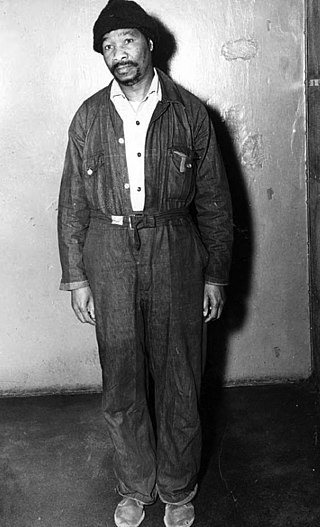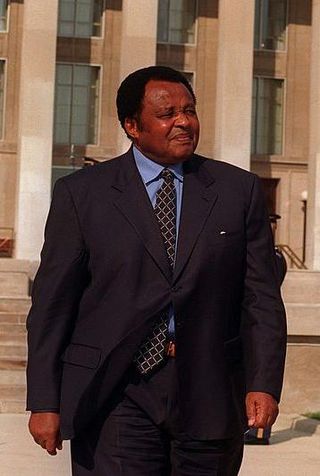Related Research Articles

The Day of Reconciliation is a public holiday in South Africa held annually on 16 December. The holiday came into effect in 1995 after the end of apartheid, with the intention of fostering reconciliation and national unity for the country. Recognising the need for racial harmony, the government chose the date for its significance to both Afrikaner and indigenous South African cultures. The celebration of the Day of Reconciliation can take the form of remembering past history, recognising veteran's contributions, marching, and other festivities.

uMkhonto we Sizwe ( was the paramilitary wing of the African National Congress, and was founded by Nelson Mandela in the wake of the Sharpeville massacre. Its mission was to fight against the South African government.

Govan Archibald Mvunyelwa Mbeki was a South African politician, military commander, Communist leader who served as the Secretary of Umkhonto we Sizwe, at its inception in 1961. He was also the son of Chief Sikelewu Mbeki and Johanna Mahala and also the father of the former South African president Thabo Mbeki and political economist Moeletsi Mbeki. He was a leader of the South African Communist Party and the African National Congress. After the Rivonia Trial, he was imprisoned (1963–1987) on charges of terrorism and treason, together with Nelson Mandela, Walter Sisulu, Raymond Mhlaba, Ahmed Kathrada and other eminent ANC leaders, for their role in the ANC's armed wing, Umkhonto we Sizwe (MK). He was sometimes mentioned by his nickname "Oom Gov".
Raymond Mphakamisi Mhlaba OMSG was an anti-apartheid activist, Communist and leader of the African National Congress (ANC) also as well the first premier of the Eastern Cape. Mhlaba spent 25 years of his life in prison. Well known for being sentenced, along with Nelson Mandela, Govan Mbeki, Walter Sisulu and others in the Rivonia Trial, he was an active member of the ANC and the South African Communist Party (SACP) all his adult life. His kindly manner brought him the nickname "Oom Ray".

Chris Hani, born Martin Thembisile Hani, was the leader of the South African Communist Party and chief of staff of uMkhonto we Sizwe, the armed wing of the African National Congress (ANC). He was a fierce opponent of the apartheid government, and was assassinated by Janusz Waluś, a Polish immigrant and sympathiser of the Conservative opposition on 10 April 1993, during the unrest preceding the transition to democracy.
Events from the year 1962 in South Africa. This year is notable for its internal and international resistance campaigns against the country's Apartheid legislation. Umkhonto we Sizwe, the militant wing of the African National Congress, made its first sabotage attacks in 1961, and Nelson Mandela traveled to Ethiopia to rally support for Umkhonto and justify the attacks. Nelson Mandela was sentenced to jail for 5 years upon returning to South Africa for illegally leaving the country. The international sporting community also showed its displeasure with the government's laws. FIFA suspended South Africa in 1962 for fielding an exclusively-white South African national football team, forcing South African football authorities to add black players to the team. The government, in turn strengthened methods of enforcing Apartheid, and the Robben Island prison was made a political prison in 1962.

Johannes "Joe" Modise was a South African political figure. He helped to found uMkhonto we Sizwe, the military wing of the African National Congress, and was its longest serving Commander in Chief, deputised at different points in time by Joe Slovo and Chris Hani. Modise headed MK for a 25-year period, from 1965 to 1990. He served as South Africa's first black Minister of Defence from 1994 to 1999 and led the formation of the post-independence defence force.
The Little Rivonia Trial was a South African apartheid-era court case in which several members of the armed resistance organization Umkhonto we Sizwe faced charges of sabotage. The accused were: Laloo Chiba, Dave Kitson, Mac Maharaj, John Matthews and Wilton Mkwayi. A confederate of theirs, Lionel Gay turned state witness, and in return, the prosecution dropped the charges against him.
Steve Vukhile Tshwete was a South African politician and activist with the African National Congress. Involved in Umkhonto we Sizwe, Tshwete was imprisoned by the apartheid authorities on Robben Island from February 1964 to 1978. Tshwete resumed activities with the ANC and become a regional coordinator for the new United Democratic Front. He later lived in exile in Zambia with the ANC. After the first free elections in South Africa in 1994, he became the new government's first Sports Minister and later was Minister of Safety and Security.

Robben Island Prison is an inactive prison on Robben Island in Table Bay, 6.9 kilometers (4.3 mi) west of the coast of Bloubergstrand, Cape Town, South Africa. Nobel Laureate and former President of South Africa Nelson Mandela was imprisoned there for 18 of the 27 years he served behind bars before the fall of apartheid. Since then, three former inmates of the prison have gone on to become President of South Africa.
Babalwa Lobishe is a South African politician who has been the deputy mayor of Nelson Mandela bay since 2023. She represented the African National Congress (ANC) in the Eastern Cape Provincial Legislature from 2019 until 2023. In December 2021, she was additionally elected as Regional Chairperson of the ANC's branch in Nelson Mandela Bay.
Litho Suka is a South African politician and former educator who served as a councillor of Nelson Mandela Bay from 2015 until 2021. He was chief whip of council between 2015 and 2016. Prior to serving in council, Suka was a Permanent Delegate to the National Council of Provinces from 2014 to 2015 and before that, a member of the National Assembly of South Africa from 2009 to 2014. Suka had served as a member of the Eastern Cape Provincial Legislature from 1994 until 2009. He is a member of the African National Congress.
Letsau Nelson Diale was a South African politician and anti-apartheid activist from Limpopo. He joined the African National Congress (ANC) in 1956 and served eight years' imprisonment on Robben Island, from 1964 to 1972, for his work with Umkhonto we Sizwe. After the end of apartheid, he represented the ANC in the National Council of Provinces from 1994 to 1999 and in the National Assembly from 1999 to 2014.
Cikizwa Ivy Gcina was a South African politician and anti-apartheid activist who represented the African National Congress (ANC) in the National Assembly from 1994 to 2009. During apartheid, she was a prominent figure in community organising in Port Elizabeth, particularly through the United Democratic Front and the Port Elizabeth Women's Organisation, the women's wing of the Port Elizabeth Black Civic Organisation.
Zamiwonga James Kati was a South African politician and anti-apartheid activist who represented the African National Congress (ANC) in the National Assembly until his death in 2006. He joined the ANC in 1949 and was a member of the Umkhonto we Sizwe underground in the Transkei.
Mzwandile McDonald Masala was a South African politician and former anti-apartheid activist. He represented the African National Congress (ANC) in the National Assembly from 1997 to 2004. He was the South African Ambassador to Zambia from 2004 to 2007.
Mdumiseni Richard Sikakane, also spelled Richard Sikhakhane, was a South African politician and stalwart of the African National Congress (ANC). He joined Umkhonto weSizwe in 1963 and was involved in its underground structures in the Greater Durban area for the next three decades. After the end of apartheid, he represented the ANC in the National Assembly for three terms from 1994 to 2009.
Mahwidi John "Mokgomana" Phala was a South African politician and former anti-apartheid activist from Limpopo. He represented the African National Congress (ANC) in the Limpopo Provincial Legislature from 1994 to 1999 and in the National Assembly from 1999 to 2009.
Holmes Peter Maluleka is a South African politician and businessman from Gauteng. A former Umkhonto we Sizwe operative, he represented the African National Congress (ANC) in the National Assembly from 2004 to 2014. During that period, he chaired the Portfolio Committee on Public Enterprises from 2010 to 2014. He later served on the board of South African Airways.
Muzivukile Curnick Ndlovu, also spelled Muzuvukile, was a South African politician, anti-apartheid activist, and trade unionist. A veteran of the African National Congress, he represented the party in the National Assembly during the first democratic Parliament from 1994 to 1999. He was also a former national chairperson of the United Democratic Front, a former secretary of the Railway and Harbour Workers' Union, and a former regional commander of Umkhonto we Sizwe (MK) in Natal Province.
References
- 1 2 3 4 5 6 7 "Nkosinathi Benson Fihla". South African History Online. 19 March 2012. Retrieved 9 April 2023.
- ↑ "General Notice: Notice 1319 of 1999 – Electoral Commission: Representatives Elected to the Various Legislatures" (PDF). Government Gazette of South Africa . Vol. 408, no. 20203. Pretoria, South Africa: Government of South Africa. 11 June 1999. Retrieved 26 March 2021.
- ↑ "General Notice: Notice 717 of 2004 - Electoral Commission – List of Names of Representatives in the National Assembly and the Nine Provincial Legislatures in Respect of the Elections Held on 14 April 2004" (PDF). Government Gazette of South Africa . Vol. 466, no. 2677. Pretoria, South Africa: Government of South Africa. 20 April 2004. pp. 4–95. Retrieved 26 March 2021.
- ↑ "Nkosinathi Benson Fihla". People's Assembly. Retrieved 9 April 2023.
- ↑ Sesant, Siyabonga (18 May 2015). "Jordaan's appointment part of changes at Nelson Mandela Bay". EWN. Retrieved 9 April 2023.
- ↑ "Ousted Mandela Bay mayor now special adviser to EC premier". The Mail & Guardian. 23 July 2015. Retrieved 9 April 2023.